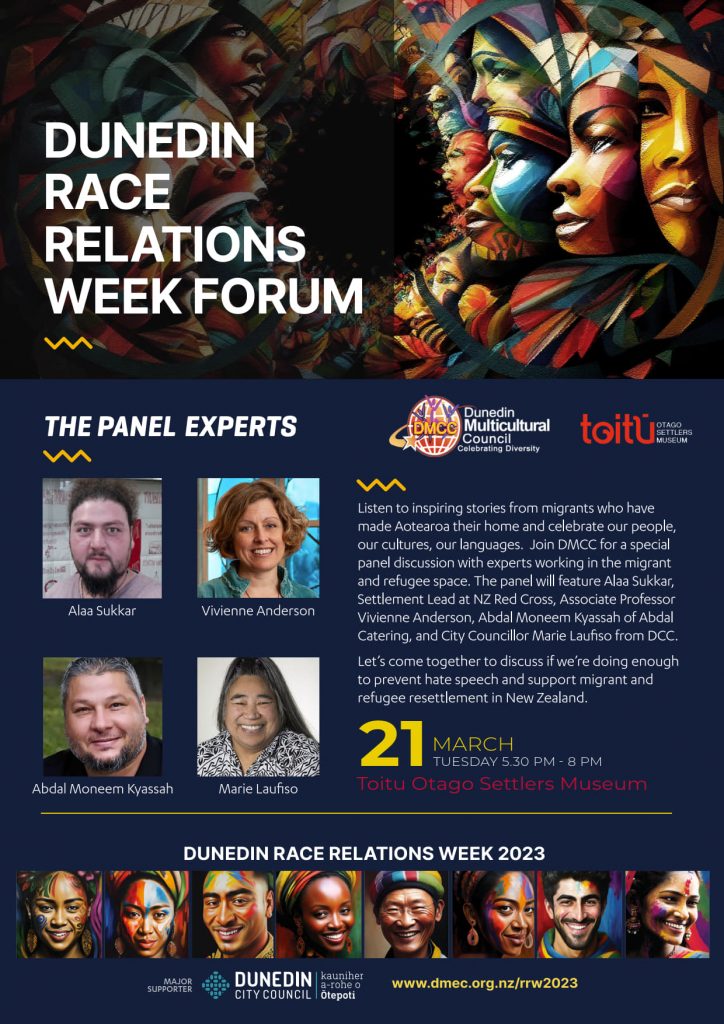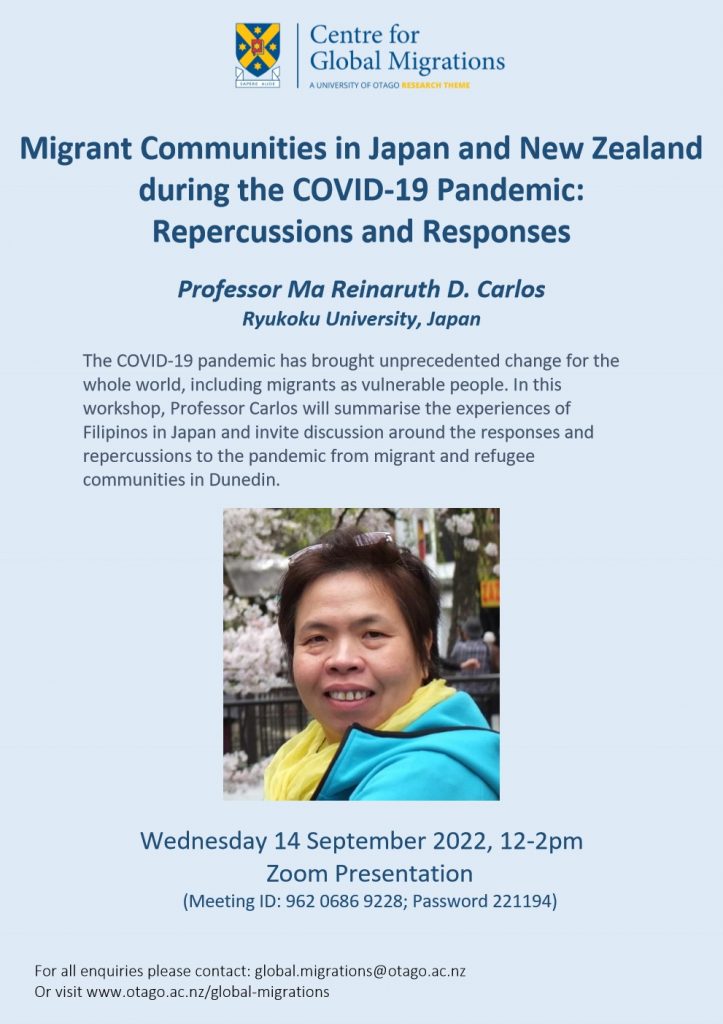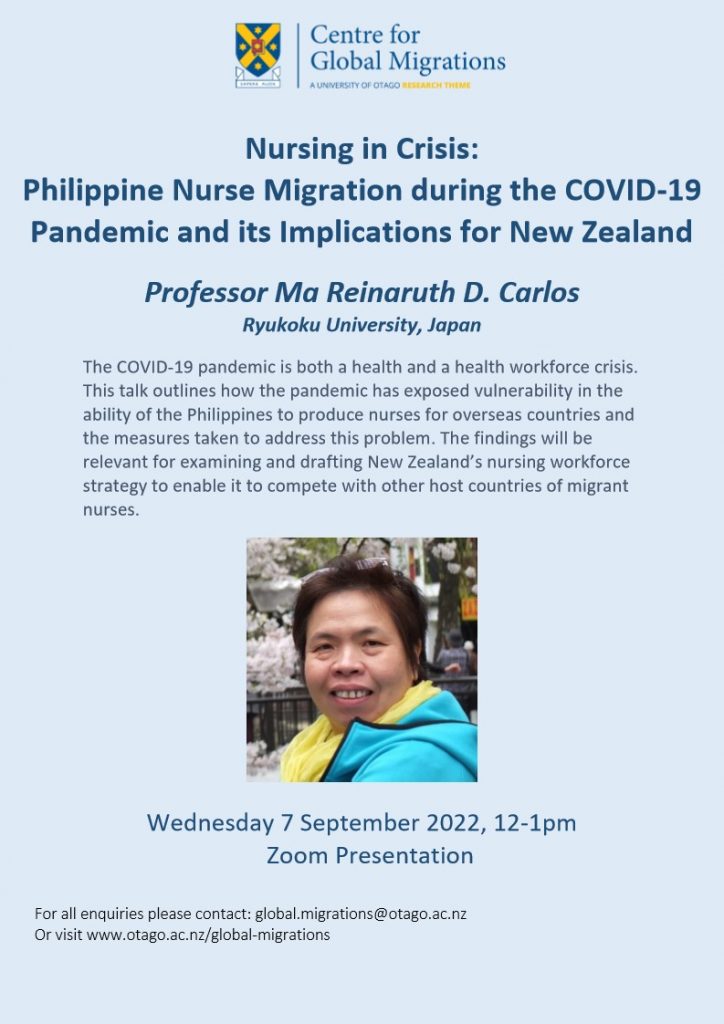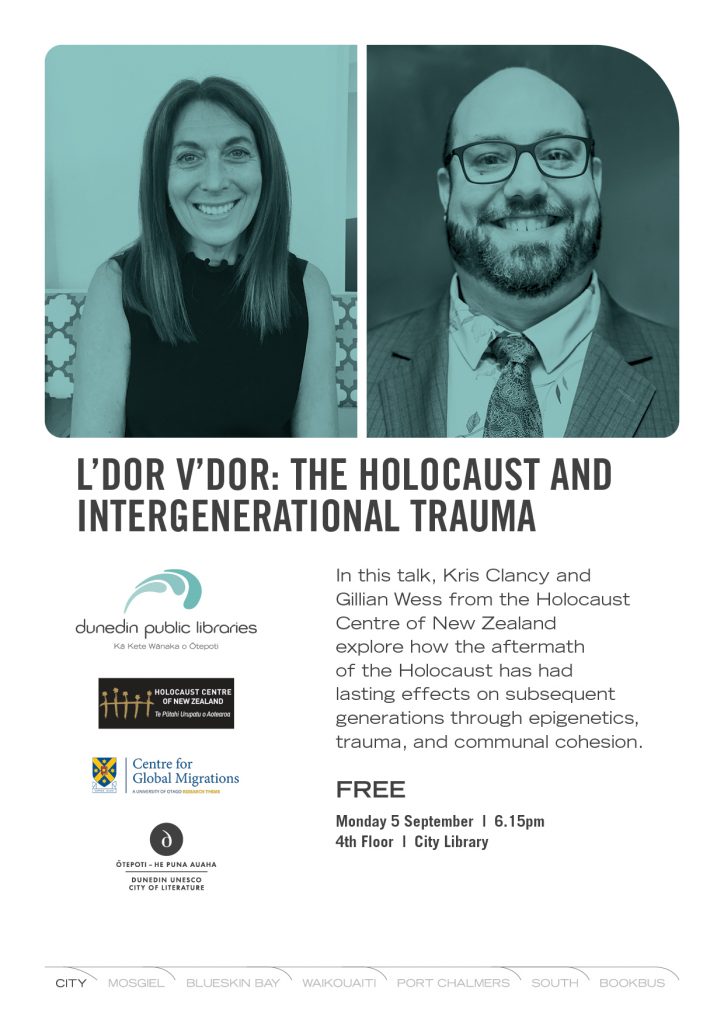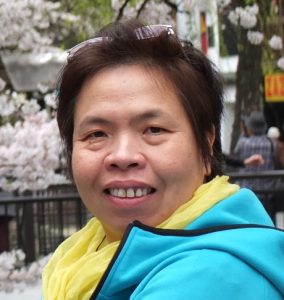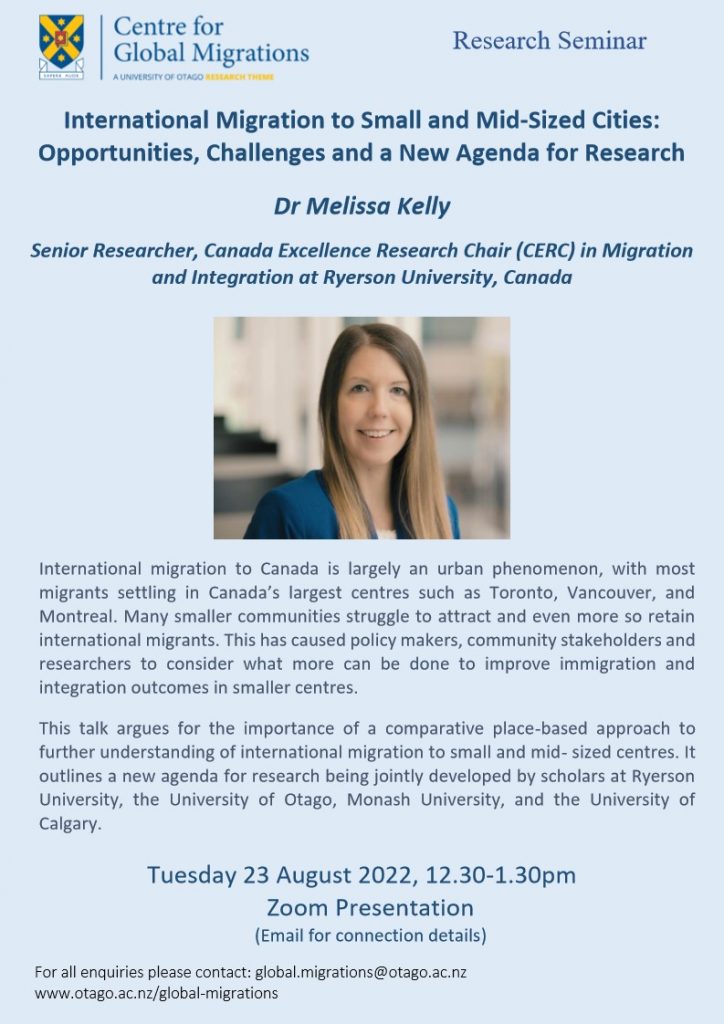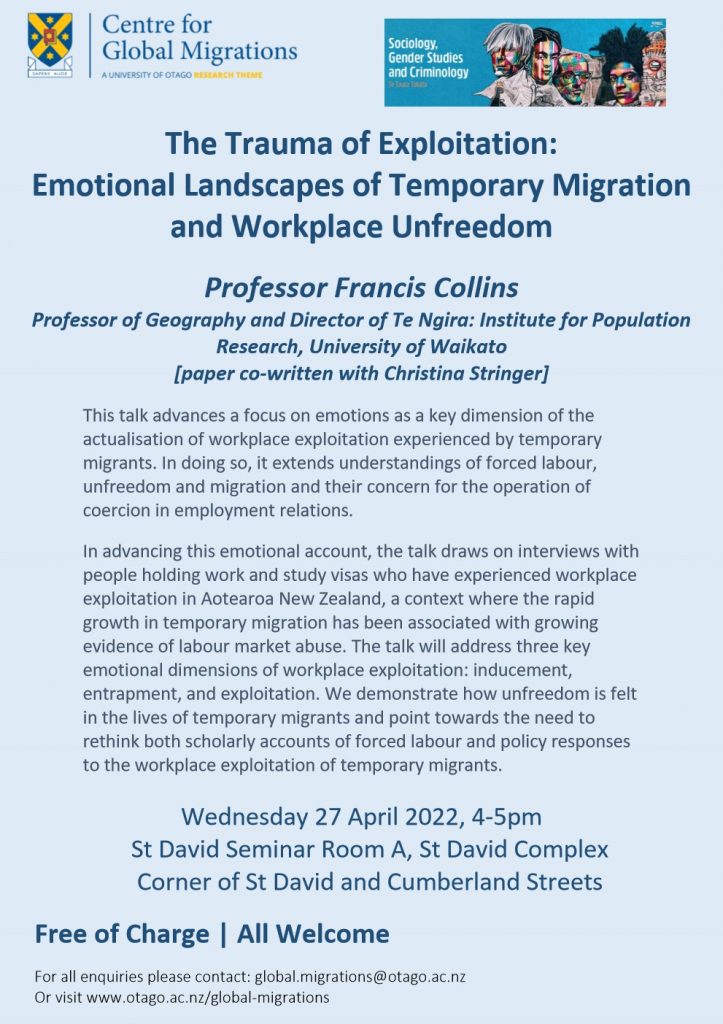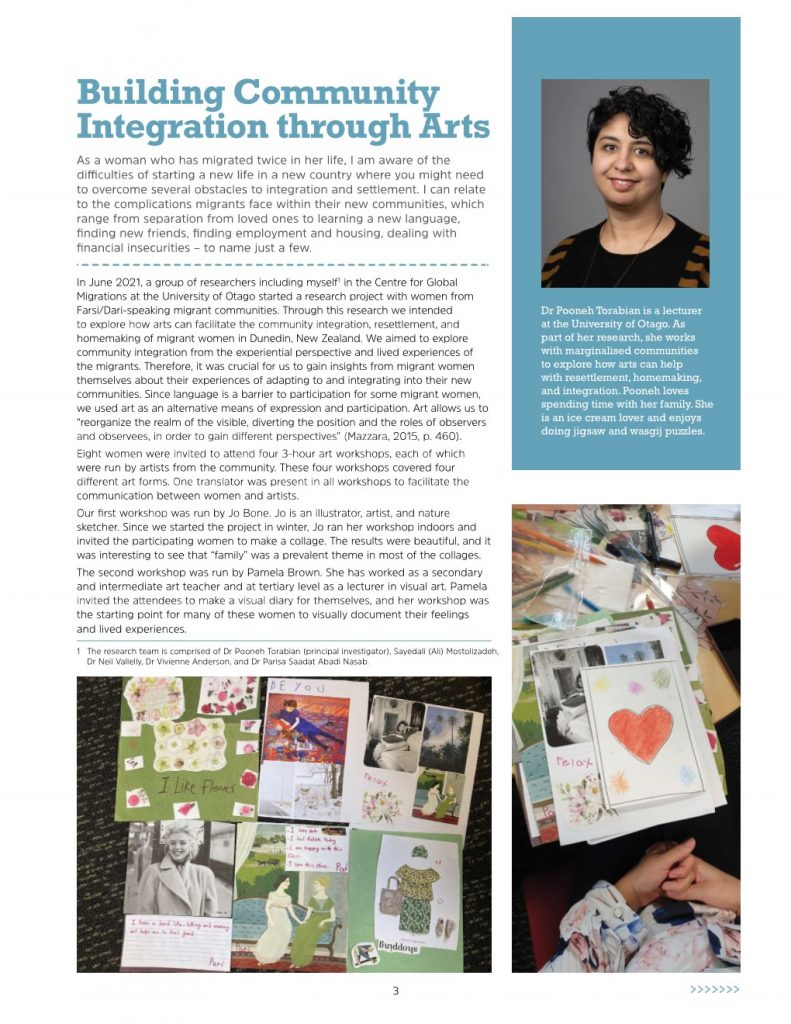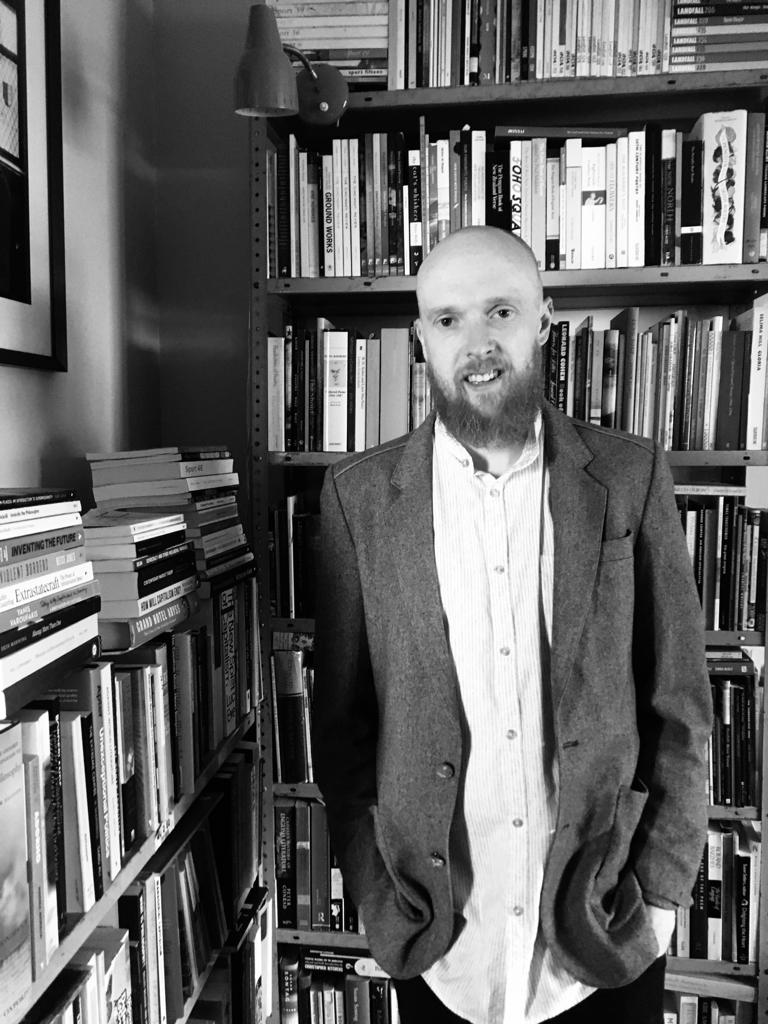Race Relations Forum 2023
We are delighted to again be supporting Race Relations Week including organising the Race Relations Week Forum. Join us at Toitū on Tuesday 21 March 2023 between 5.30pm (for a 6pm start) and 8pm to hear from experts working in the migrant and refugee space as they reflect on whether we’re doing enough to support migrant and refugee resettlement in New Zealand.
Our panellists are:
- Associate Professor Vivienne Anderson
- Abdal Moneem Kyassah
- Councillor Marie Laufiso
- Alaa Sukkar
All welcome.
Workshop: Migrant Communities in Japan and New Zealand
Migrant Communities in Japan and New Zealand during the COVID-19 Pandemic: Repercussions and Responses
PROFESSOR MA REINARUTH D. CARLOS
Ryukoku University, Japan
Wednesday 14 September 2022, 12-2pm (on Zoom)
The COVID-19 pandemic has brought unprecedented change for the whole world, including migrants as vulnerable people. In this workshop, Professor Carlos will summarise the experiences of Filipinos in Japan and invite discussion around the responses and repercussions to the pandemic from migrant and refugee communities in Dunedin.
Online Seminar: Nursing in Crisis
Nursing in Crisis: Philippine Nurse Migration during the COVID-19 Pandemic and its Impliations for New Zealand
PROFESSOR MA REINARUTH D. CARLOS
Ryukoku University, Japan
Wednesday 7 September 2022, 12-1pm (on Zoom)
The COVID-19 pandemic is both a health and a health workforce crisis. This talk outlines how the pandemic has exposed vulnerability in the ability of the Philippines to produce nurses for overseas countries and the measures taken to address this problem. The findings will be relevant for examining and drafting New Zealand’s nursing workforce strategy to enable it to compete with other host countries of migrant nurses.
Public Talk: L’Dor V’Dor: The Holocaust and Intergenerational Trauma
L’Dor V’Dor: The Holocaust and Intergenerational Trauma
KRIS CLANCY AND GILLIAN WESS
Holocaust Centre of New Zealand
Monday 5 September 2022, 6.15-7.30pm
Dunningham Suite, 4th Floor, Dunedin Public Library
After the Second World War, the world was shocked at the atrocities committed by the Nazis and the collaborators. Through the Nuremberg Trials, new standards in international law were established to prevent future genocides, but not all the perpetrators were caught. What happened to them? What challenges does this create in bringing other perpetrators of genocide to justice? Where was New Zealand placed among this?
Through looking at the immediate effects of the Nuremberg Trials and those Nazis that evaded prosecution, HCNZ will examine certain war criminals, from Nazis to modern day, who were able to escape prosecution and the role in which New Zealand played in bringing them to justice.
2022 Visiting Lecturer: Professor Ma. Reinaruth Carlos
We are delighted to announce that Professor Ma. Reinaruth Carlos from Ryukoku University in Japan will be our 2022 Visiting Lecturer. She will work with our member Dr Arlene Ozanne to develop collaborative research applications and publications.
During her time in Dunedin, Professor Carlos will give a public talk and a workshop.
Wednesday 7 September, 12-1pm: Public Talk on Nursing in Crisis: Philippine Nurse Migration during the COVID-19 Pandemic and its Implications for New Zealand
Wednesday 14 September, 12-2pm: Workshop on Migrant Communities in Japan and New Zealand during the COVID-19 Pandemic: Repercussions and Responses.
Online Seminar: International Migration to Small and Mid-Sized Cities
International Migration to Small and Mid-Sized Cities: Opportunities, Challenges and a New Agenda for Research
Dr Melissa Kelly
Senior Researcher, Canada Excellence Research Chair (CERC) in Migration and Integration at Ryerson University, Canada
Tuesday 23 August 2022, 12.30-1.30pm
International migration to Canada is largely an urban phenomenon, with most migrants settling in Canada’s largest centres such as Toronto, Vancouver, and Montreal. Many smaller communities struggle to attract and even more so retain international migrants. This has caused policy makers, community stakeholders and researchers to consider what more can be done to improve immigration and integration outcomes in smaller centres.
This talk argues for the importance of a comparative place-based approach to further understanding of international migration to small and mid- sized centres. It outlines a new agenda for research being jointly developed by scholars at Ryerson University, the University of Otago, Monash University, and the University of Calgary.
Lottery Health Grant Funding Success for Dr Arlene Ozanne
Many congratulations to our member Dr Arlene Ozanne (Department of Economics) who has been awarded a Lottery Health Grant to conduct research relevant to the specific needs of migrants under the Pacific Access Category residence visa (PAC migrants). The research aims to take a closer consideration of migrants’ cultural values and socio-economic standing and incorporate them into strategic designs to encourage access and utilisation of healthcare and social services that could lead to improved health outcomes.
We look forward to hearing more about Arlene’s research.
Seminar: The Trauma of Exploitation
Professor Francis Collins, University of Waikato
Wednesday 27 April 2022, 4-5pm
St David Seminar Room A, St David Complex, University of Otago, Dunedin
This talk advances a focus on emotions as a key dimension of the actualisation of workplace exploitation experienced by temporary migrants. In doing so, it extends understandings of forced labour, unfreedom and migration and their concern for the operation of coercion in employment relations.
In advancing this emotional account, the talk draws on interviews with people holding work and study visas who have experienced workplace exploitation in Aotearoa New Zealand, a context where the rapid growth in temporary migration has been associated with growing evidence of labour market abuse. The talk will address three key emotional dimensions of workplace exploitation: inducement, entrapment, and exploitation. We demonstrate how unfreedom is felt in the lives of temporary migrants and point towards the need to rethink both scholarly accounts of forced labour and policy responses to the workplace exploitation of temporary migrants.
This talk is co-hosted by the Centre for Global Migrations and Sociology, Gender Studies and Criminology at the University of Otago.
Speaker Details:
Professor Francis Collins is Professor Geography and Director of Te Ngira: Institute for Population Research at the University of Waikato. The paper he is presenting is co-authored with Christina Stringer, Associate Professor of International Business and Director of the Centre for Research on Modern Slavery at the University of Auckland Business School.
Building Community Integration Through Arts Report
The Teachers of English to Speakers of Other Languages Aotearoa New Zealand newsletter – TESOLANZ News, 39:3 (2021) – contains Dr Pooneh Torabian’s summary of, and images from, 4 recent workshops with women from Farsi/Dari-speaking migrant communities who now live in Dunedin. Each workshop was run by artists from the community.
Pooneh says in the article: ‘As a woman who has migrated twice in her life, I am aware of the difficulties of starting a new life in a new country, where you might need to overcome several obstacles to integration and settlement. I can relate to the complications migrants face within their new communities, which range from separation from loved ones to learning a new language, finding new friends, finding employment and housing dealing with financial insecurities – to name just a few’.
The workshops were funded by the Centre for Global Migrations and the research team plan to publish results this year and develop the project further through external funding. We look forward with interest to their findings and ongoing work.
The report can be downloaded here: Pooneh project TESOLANZ 2021.
Rutherford Foundation Postdoctoral Fellowship Success for Dr Neil Vallelly
Many congratulations to our member Dr Neil Vallelly for his success in being awarded a prestigious Rutherford Foundation Postdoctoral Fellowship for his project on neoliberalism and regimes of migrant detention in New Zealand. Traditionally, we hear about the suffering of migrants and refugees in Australia, Europe, and the United States, rather than New Zealand. Dr Vallelly’s ground-breaking project, however, will interrogate the role of borders, migration, and contemporary migrant detention within Aotearoa, to throw light on these global practices. He will do so through a three-pronged framework: investigating the role of borders and migration in the history of neoliberal thought; examining New Zealand’s migration policies since 1980; and studying practices of detention through personal testimonies of refugees and asylum seekers. By blending his research interests in neoliberalism and forced displacement, Dr Vallelly’s project will critically inform migration and border policies and refugee resettlement practices in New Zealand. We look forward to hearing more about his work over the next few years.
Dr Vallelly’s book Futilitarianism: Neoliberalism and the Production of Uselessness is now available.

